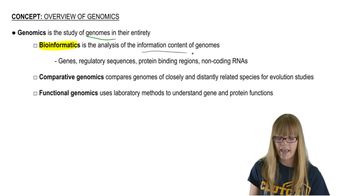Write a brief essay that discusses the impact of recombinant DNA technology on genetics as we perceive the discipline today.
Table of contents
- 1. Introduction to Genetics51m
- 2. Mendel's Laws of Inheritance3h 37m
- 3. Extensions to Mendelian Inheritance2h 41m
- 4. Genetic Mapping and Linkage2h 28m
- 5. Genetics of Bacteria and Viruses1h 21m
- 6. Chromosomal Variation1h 48m
- 7. DNA and Chromosome Structure56m
- 8. DNA Replication1h 10m
- 9. Mitosis and Meiosis1h 34m
- 10. Transcription1h 0m
- 11. Translation58m
- 12. Gene Regulation in Prokaryotes1h 19m
- 13. Gene Regulation in Eukaryotes44m
- 14. Genetic Control of Development44m
- 15. Genomes and Genomics1h 50m
- 16. Transposable Elements47m
- 17. Mutation, Repair, and Recombination1h 6m
- 18. Molecular Genetic Tools19m
- 19. Cancer Genetics29m
- 20. Quantitative Genetics1h 26m
- 21. Population Genetics50m
- 22. Evolutionary Genetics29m
1. Introduction to Genetics
Modern Genetics
Problem 30c
Textbook Question
Ethical and social issues have become a large part of the public discussion of genetics and genetic testing. Choose two of the propositions presented here and prepare a list of arguments for and against them.
Prenatal genetic testing and genetic testing later in life should be available for hereditary conditions that cannot currently be treated or effectively managed.
 Verified step by step guidance
Verified step by step guidance1
Understand the proposition: Prenatal genetic testing and genetic testing later in life for hereditary conditions that cannot currently be treated or effectively managed. This involves evaluating the ethical, social, and scientific implications of such testing.
List arguments in favor of the proposition: For example, prenatal genetic testing can help parents prepare emotionally and financially for a child with a hereditary condition. It can also provide valuable information for family planning and allow individuals to make informed decisions about their health later in life.
List arguments against the proposition: For instance, testing for conditions that cannot be treated may lead to psychological distress or discrimination. There are also concerns about privacy, potential misuse of genetic information, and the ethical implications of testing without the possibility of intervention.
Consider the broader ethical and social context: Reflect on how cultural, religious, and societal values might influence opinions on this issue. For example, some may view genetic testing as a way to reduce suffering, while others may see it as interfering with natural processes.
Summarize the arguments: Create a balanced summary that highlights the complexity of the issue, emphasizing the need for careful consideration of both the benefits and potential harms of genetic testing in these scenarios.
 Verified video answer for a similar problem:
Verified video answer for a similar problem:This video solution was recommended by our tutors as helpful for the problem above
Video duration:
1mPlay a video:
Was this helpful?
Key Concepts
Here are the essential concepts you must grasp in order to answer the question correctly.
Prenatal Genetic Testing
Prenatal genetic testing involves analyzing the genetic material of a fetus to identify potential genetic disorders or conditions. This testing can provide critical information to expectant parents about the health of their unborn child, allowing for informed decision-making regarding pregnancy management. However, it raises ethical concerns about the implications of such knowledge, including the potential for selective termination based on test results.
Recommended video:
Guided course

History of Genetics
Ethical Considerations in Genetic Testing
Ethical considerations in genetic testing encompass the moral implications of testing for hereditary conditions, particularly when no effective treatments exist. Key issues include the potential for discrimination based on genetic information, the psychological impact on individuals and families, and the societal responsibility to ensure equitable access to testing. These considerations are crucial in shaping policies and practices surrounding genetic testing.
Recommended video:
Guided course

History of Genetics
Informed Consent
Informed consent is a fundamental principle in medical ethics, requiring that individuals understand the risks, benefits, and limitations of genetic testing before proceeding. This process ensures that patients make voluntary and educated decisions regarding their health care. In the context of genetic testing, informed consent is particularly important due to the complex nature of genetic information and its potential implications for both the individual and their family.
Recommended video:
Guided course

Genomics Overview
Related Videos
Related Practice
Textbook Question
741
views


